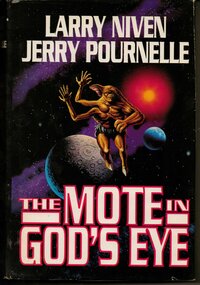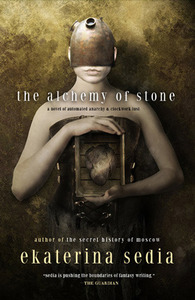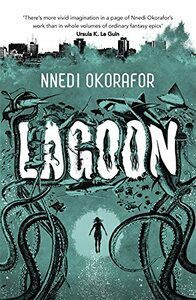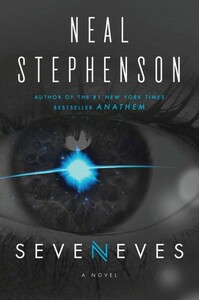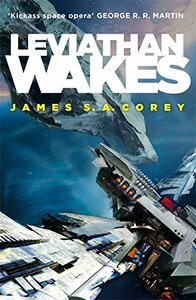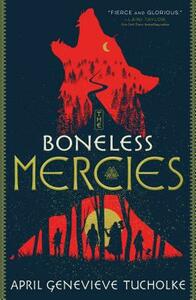Take a photo of a barcode or cover
mtherobot's Reviews (866)
Considering this is as two separate books; overall rating is an average between the first two-thirds, which I would give a four, and the end third, which I rate (generously) as a two.
The first part of the book is...well, it's interesting. I mean that in the positive sense and the polite one. It's not exactly plot-driven or character-driven. Frankly, the plot (to the extent that this book has a plot) is pretty weak; it's a pretty rote play-by-play that doesn't lead anywhere, and the most clearly climactic point (you know, the part where everyone dies?) is glossed over in Stephenson's summary voice instead of from any of the characters' POV. And boy, the characters! They aren't unlikable, exactly, except for the characters we aren't supposed to like, but they are flatter than a bug on a windshield. Some of them get sympathy-by-association with the real life people they're copied from (hello, Elon! nice to see you there, Malala!) but I couldn't root for these people if they were last humans in orbit.
Now, I know what you're thinking: wasn't this the part of the book you liked? And it is! Despite the piss-poor plot and cardboard cutout characters, I enjoyed reading this. Because it's interesting. Stephenson obviously doesn't give a damn about anything but the idea, and that's okay. It's a good idea. It's an interesting idea. It's an idea that I enjoyed reading about. Imagine The Martian without Mark Watney's charming personality, or Rendezvous with Rama without, like, the aliens and stuff.
There's also something to be said about the quality of writing. In a word, it's good. Say what you will about the technical asides (like, that they're tedious and vaguely patronizing? like, did you really have to explain what delta-vee means, as if I haven't taken a single physics class, and also as if you couldn't just use the normal human words "accelerate" and "decelerate"?) but they are about as compelling as they can possibly be. Are they so compelling that I didn't skip over them? No. Are they compelling enough that I didn't skip over them the first half-dozen or so times? Yes. And from those half-dozen times, I can tell you that if I were commissioning someone to write an intro to orbital mechanics textbook, I would choose Neal Stephenson.
My one (one?) complaint about this giant chunk of a book is Stephenson's treatment of Aida, who was the only character who felt like a real person. For the twenty or so pages before I realized how god-awful the second part is, I wished Stephenson had written this whole thing from Aida's perspective. Even knowing what I know now about Stephenson's character development skills, I'm not quite comfortable with how willing the narrative is to condemn her and her choices.
Okay, now for the second part! Perhaps needless to say, but from here on out spoilers abound.
Man oh man. Where to start? If the plot of the first part was flat, the plot here is truly one dimensional. Our rag-tag band of racial stereotypes hitchhike to the newly terraformed earth to, like, do something, I guess? The twist (that the other named characters from the first part actually survived after all) was so clearly telegraphed that I wasn't even sure it was supposed to be a twist. I mean, this is Chekhov's Gun for dummies. The only real surprise was that the story didn't end with the descendants of the Martian expedition touching down in a flying saucer or something equally trite.
As for the characters, they haven't changed at all in the five thousand years they narrative insists have passed. Stealing characters from real life is cheap, I guess, but I wouldn't go so far as to say it's bad writing. Stealing characters from yourself is...I don't even know. And, for the record, explaining those similarities away by attributing them to racial stereotypes makes it exponentially worse. Just because the races aren't the same ones we have today doesn't make the in-universe racism less cringey, especially since we're clearly supposed to agree with it.
The saving grace of the first part of the story was the idea. In this part, there is simply not an idea to be had. Stephenson doesn't seem interested in how human culture might change over time, or what the consequences of genetic engineering (also known, in this case, as eugenics) would be, or how and why a space colony would go about terraforming earth's burning corpse.
And let me touch for a second on epigenetics. I can excuse bad science when it's the driving force of a story—when you're trying to imagine what it would be like if, for example, people could adapt in realtime to their environment—but here it just felt copy-pasted in from a different (better?) story. Mostly it was just weird and distracting.
And that's not even to mention the human interest angle. What would it be like to know in no uncertain terms that your personality has been chosen for you? What does it mean to be a native of planet you've never been to? To what extent is any individual beholden to the choices of their ancestors? The really infuriating thing about this narrative is that it could be so good but just isn't. In fact I hated this book so much that it made be retroactively dislike the first part. (Now that I think of it—how horrific would it be to go from accomplished astronaut scientist to baby factory? how do reconcile the personal ickyness of eugenics with the practical need to ensure humanity's survival? and why is Neal Stephenson so not curious about it?)
Anyway—I think this is a premise that could be really interesting, but the level of introspection the story needs just simply isn't there. The only redeeming quality is the writing itself, though maybe if it was a little more incomprehensible I could have convinced myself that everything else wasn't quite so bad.
The first part of the book is...well, it's interesting. I mean that in the positive sense and the polite one. It's not exactly plot-driven or character-driven. Frankly, the plot (to the extent that this book has a plot) is pretty weak; it's a pretty rote play-by-play that doesn't lead anywhere, and the most clearly climactic point (you know, the part where everyone dies?) is glossed over in Stephenson's summary voice instead of from any of the characters' POV. And boy, the characters! They aren't unlikable, exactly, except for the characters we aren't supposed to like, but they are flatter than a bug on a windshield. Some of them get sympathy-by-association with the real life people they're copied from (hello, Elon! nice to see you there, Malala!) but I couldn't root for these people if they were last humans in orbit.
Now, I know what you're thinking: wasn't this the part of the book you liked? And it is! Despite the piss-poor plot and cardboard cutout characters, I enjoyed reading this. Because it's interesting. Stephenson obviously doesn't give a damn about anything but the idea, and that's okay. It's a good idea. It's an interesting idea. It's an idea that I enjoyed reading about. Imagine The Martian without Mark Watney's charming personality, or Rendezvous with Rama without, like, the aliens and stuff.
There's also something to be said about the quality of writing. In a word, it's good. Say what you will about the technical asides (like, that they're tedious and vaguely patronizing? like, did you really have to explain what delta-vee means, as if I haven't taken a single physics class, and also as if you couldn't just use the normal human words "accelerate" and "decelerate"?) but they are about as compelling as they can possibly be. Are they so compelling that I didn't skip over them? No. Are they compelling enough that I didn't skip over them the first half-dozen or so times? Yes. And from those half-dozen times, I can tell you that if I were commissioning someone to write an intro to orbital mechanics textbook, I would choose Neal Stephenson.
My one (one?) complaint about this giant chunk of a book is Stephenson's treatment of Aida, who was the only character who felt like a real person. For the twenty or so pages before I realized how god-awful the second part is, I wished Stephenson had written this whole thing from Aida's perspective. Even knowing what I know now about Stephenson's character development skills, I'm not quite comfortable with how willing the narrative is to condemn her and her choices.
Okay, now for the second part! Perhaps needless to say, but from here on out spoilers abound.
Man oh man. Where to start? If the plot of the first part was flat, the plot here is truly one dimensional. Our rag-tag band of racial stereotypes hitchhike to the newly terraformed earth to, like, do something, I guess? The twist (that the other named characters from the first part actually survived after all) was so clearly telegraphed that I wasn't even sure it was supposed to be a twist. I mean, this is Chekhov's Gun for dummies. The only real surprise was that the story didn't end with the descendants of the Martian expedition touching down in a flying saucer or something equally trite.
As for the characters, they haven't changed at all in the five thousand years they narrative insists have passed. Stealing characters from real life is cheap, I guess, but I wouldn't go so far as to say it's bad writing. Stealing characters from yourself is...I don't even know. And, for the record, explaining those similarities away by attributing them to racial stereotypes makes it exponentially worse. Just because the races aren't the same ones we have today doesn't make the in-universe racism less cringey, especially since we're clearly supposed to agree with it.
The saving grace of the first part of the story was the idea. In this part, there is simply not an idea to be had. Stephenson doesn't seem interested in how human culture might change over time, or what the consequences of genetic engineering (also known, in this case, as eugenics) would be, or how and why a space colony would go about terraforming earth's burning corpse.
And let me touch for a second on epigenetics. I can excuse bad science when it's the driving force of a story—when you're trying to imagine what it would be like if, for example, people could adapt in realtime to their environment—but here it just felt copy-pasted in from a different (better?) story. Mostly it was just weird and distracting.
And that's not even to mention the human interest angle. What would it be like to know in no uncertain terms that your personality has been chosen for you? What does it mean to be a native of planet you've never been to? To what extent is any individual beholden to the choices of their ancestors? The really infuriating thing about this narrative is that it could be so good but just isn't. In fact I hated this book so much that it made be retroactively dislike the first part. (Now that I think of it—how horrific would it be to go from accomplished astronaut scientist to baby factory? how do reconcile the personal ickyness of eugenics with the practical need to ensure humanity's survival? and why is Neal Stephenson so not curious about it?)
Anyway—I think this is a premise that could be really interesting, but the level of introspection the story needs just simply isn't there. The only redeeming quality is the writing itself, though maybe if it was a little more incomprehensible I could have convinced myself that everything else wasn't quite so bad.
